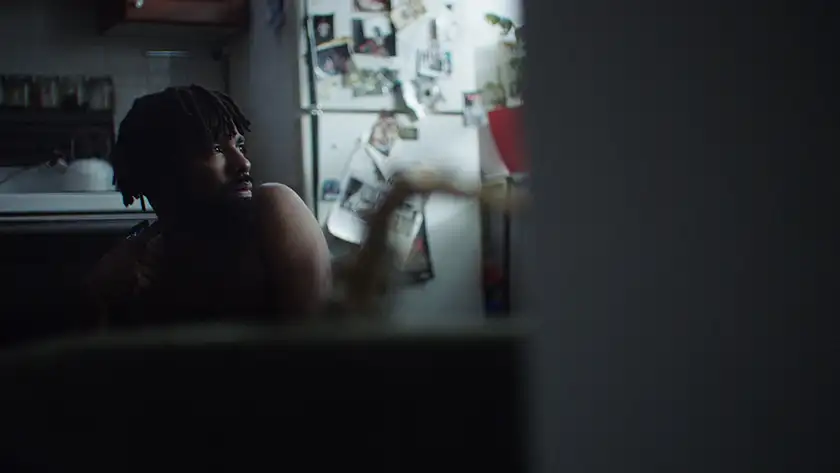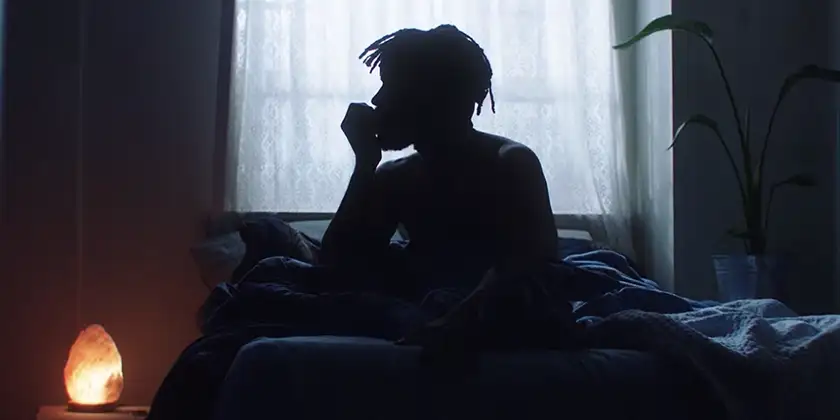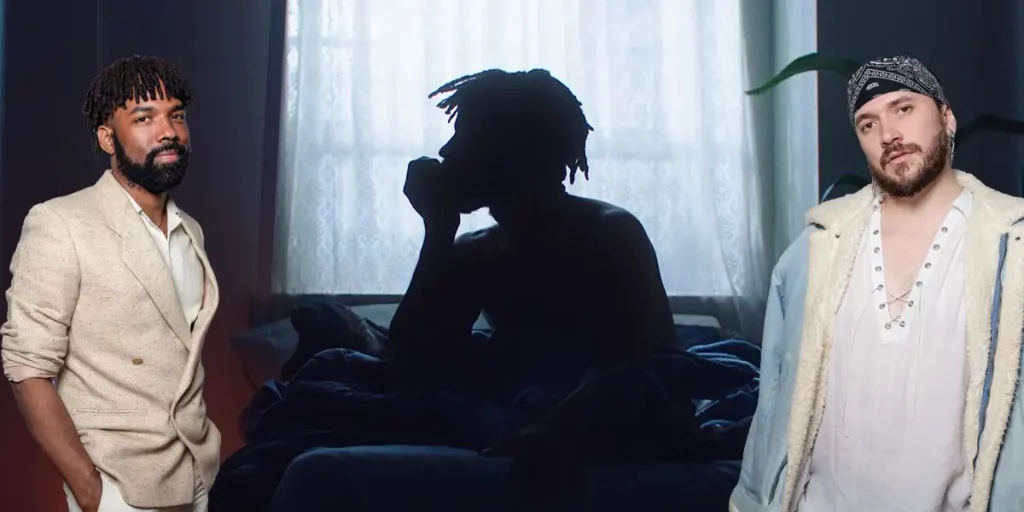On the day of the London premiere of I Don’t Know Who You Are at BFI Flare, writer-director M.H. Murray and star Mark Clennon sat down with us for an interview.
M.H. Murray ’s debut feature I Don’t Know Who You Are is a compelling story of a man in need of crucial medication after a sexual assault. Benjamin (Mark Clennon) must find a way to come up with $1000 in 72 hours to receive a timely course of HIV preventative drugs. Through conversations with old friends and the kindness of those around him, Benjamin begins raising the money to pay for his prescription before time runs out. Set with the gorgeous backdrop of Toronto, I Don’t Know Who You Are is a pivotal film for the queer community, illustrating the loneliness and emotional toll the Canadian healthcare system has on people.
We sat down with writer-director M.H. Murray and lead actor and co-writer Mark Clennon and gossiped all about significant influences, the importance of queer representation on screen and how much we love the Horseshoe Tavern bar and music venue in Toronto. Read our interview!
THE CASTING PROCESS AND SCRIPT IMPROVISATIONS IN I DON’T KNOW WHO YOU ARE
What was the casting process like for this film?
M.H. Murray: Mark and I did a short film a couple years ago, Ghost, that involved the same character. It follows Benjamin [Clennon] getting ghosted, and that was our chance to experiment working together. I always knew that I didn’t want it to be me in the lead. I love Lena Dunham, and filmmakers like her, who do their own stuff, and I wanted to tell a personal story, but through a different character. When I had the idea to tell this story through the character of Benjamin, I pitched it to Mark, and he was so supportive: I always knew it was going to be Mark in the lead role. The rest of the casting process was chaotic. It took a long time just to start it, unfortunately.
Once we started casting, we did the traditional process, like auditions and asking around. For Benjamin’s mother, I’d asked some of my Jamaican friends. Andrew Hamilton had made a short film called Duppy, which Grace [McDonald, who was cast to play Benjamin’s mother] was in. When I watched it, I thought she was amazing. Her and Mark just hit it off.
I read that the healthcare professionals were all real.
M.H.M.: When it came to the healthcare workers, we realised we couldn’t afford to cast twenty characters, as we had a small amount of money to work with. We really focused on the love interest, Malcolm [Anthony Diaz], and Benjamin’s friend Ariel [Nat Patricia Manuel]. We knew we had to find really strong actors for those roles, because they have really intense, emotional lines. It then made sense to cast real healthcare workers. I had met Randy [Davis], who is the clinician who performs the rapid HIV test in the film, through Instagram. I asked him initially just to be a consultant on the film. But once I started chatting with him, I thought he was so sweet and personable!
Cheryl [Wagner], the emergency room doctor, was the neighbour of one of our producers, Victoria [Long]. Cheryl has been working in the field of HIV healthcare since the 80s, when the epidemic started. She just made sense. She surprised us on set: her eyes are so expressive. The casting of the pharmacist [Chris Wong] was a happy mistake. We went to scout this pharmacy and he was like, “Hey! I like acting!” He had a good vibe about him. He’s a real pharmacist, too. It was a very natural, but unusual process.

The script is so raw and naturalistic. How much of it was improvised and how much was written down beforehand?
M.H.M.: Mark loves to chat! [laughs] He definitely improvised a lot of dialogue. All of the scenes were structured and had certain lines that he had to hit. The scenes with Benjamin and Ariel were the most improvised. I just rolled the camera and let them kick it! They said a lot of funny stuff that I didn’t get to include in the film.
Mark is such a fun actor to work with. You can just throw him into a situation and he’ll basically act like he’s real. That was really fun for me as an editor. It was also a little bit daunting as I had a lot of footage! But I think that’s my process. I like to encourage actors to improvise. Even if you have to steer the situation in a certain direction because of the plot, you can still get these really beautiful natural moments if you just give the actors space to breathe and to just exist. I love watching people just exist.
Mark Clennon: Mat [Murray] is an actor’s dream! Directors are motivated by the big picture, which is important, but Mat gave us so much freedom on the set, to follow the script but to also express ourselves. I find, as an actor, you get the best performances when you trust the director. There’s a vision to execute, but it’s great to do it in a way that’s natural. Mat’s thing as a director is finding natural performances and creating a space for it. I Don’t Know Who You Are is my first feature film, but I’ve worked on other things before where you don’t get the chance to act like this.
M.H. MURRAY & MARK CLENNON ON QUEER INFLUENCES, WILL AND GRACE, AND MOVIE MARATHONS
For the character of Benjamin, did you bring in any influences from any other films or characters you’d seen on screen?
Mark Clennon: That’s a really good question. I’ve never really thought about that before. On some level, all actors are influenced by other performances and movies. I’m sure somewhere deep in my mind there’s something that I want to be like. I’m a very aloof actor, but in a sense that I’m not in my head. I don’t overthink it. I just let the scenes and the moments motivate me and carry me. Doing the film was great, and I had a fun time acting in it.
I dissociated myself from my body during some of the scenes. I hope to keep the energy of throwing myself into something and not thinking about it too much in future projects.
You were so great in it. Benjamin is one of my favourite leads of the year so far. There’s so much integrity to the character.
Both: Oh wow. Thank you.
What are your favourite pieces of queer filmmaking?
M.H. Murray: A lot of queer movies changed my life. Weekend by Andrew Haigh is such a beautiful film. It was the first film I watched that showed explicit intimacy between two men. Happy Together by Wong Kar-wai is another: I saw it again recently with a whole audience in Glasgow. It’s such a funny, weird, scrappy movie. You get to see this raw passion and love between two men. I love films which have underlying queer films.
Claire Denis’ Beau Travail is one of the gayest movies ever but it’s not explicitly that gay. I love the way she shows the underlying feelings of angst that men can have towards each other when they feel attached to one another. I’m really interested in that. I definitely brought a lot of influences from that to my film in the sense of the exploration of things which are being said. But also that angsty underbelly when you’re attracted to someone you don’t really want to be attracted to as a queer man. Like Benjamin with his ex.
M.C.: My answer is very trashy in comparison to Mat’s. He’s always like, “I love this really artsy film from Germany!”. My favourite gay film of all time is actually a TV show and it’s Will and Grace. Growing up in Jamaica, there’s no gay anything on TV, period. Not even a gay best friend or a secretary. It was the first time I actually saw gay people, and I was like “Wait… no one’s trying to kill them?!”. I remember watching it and feeling like I was watching porn, because I was so afraid that someone would catch me. I kept looking over my shoulder hoping that no one would walk in. It was such a big moment for me to see gay men. It was so inspiring. The movie that really touched me, though, was Call Me by Your Name.
One thing I love doing is having mini movie marathons. What two films would you pair with I Don’t Know Who You Are for that perfect movie marathon?
M.H.M.: One of the big influences for me, and one of my favourite films ever, is Three Colours: Blue. There are a few moments in my film that are homages to it. They’re similar explorations of a person experiencing trauma and then trying to retreat into themselves. The beautiful thing about being human is that you can try as hard as you can to hide away from the world, but you inevitably have to interact with someone else. You can’t hide from humans, and that’s just beautiful. I’d pick that one to screen first. And then I Don’t Know Who You Are would go in the middle.
And then we’d need a cute and uplifting one to end on. Maybe Weekend, or Happy Together. In Three Colours: Blue, Juliette Binoche loses her family and builds towards something new. In I Don’t Know Who You Are, Benjamin loses himself, and then finds himself in a new relationship. And then, in Happy Together, they’re both struggling in the relationship. A lot of trauma, and a lot of gay tears, but an interesting timeline.
M.C.: I’m not sure what I’d pick to connect with the same audiences. But I’d pick Call Me by Your Name. And honestly, How Stella Got Her Groove Back [1998]. I saw it again recently. Stella [the protagonist, played by Angela Bassett] goes to Jamaica to rebuild her life. I know it’s not the same world, but I think it could be an interesting connection.
M.H. MURRAY & MARK CLENNON ON TORONTO, LONDON AND THE HORSESHOE TAVERN
I used to live around the corner from the Horseshoe Tavern, the venue where Benjamin performs at the end of the movie. How important was it to shoot I Don’t Know Who You Are in the city of Toronto?
M.H. Murray: I didn’t want to be showing the CN Tower and things like that, but I wanted to show the Streetcar and the Horseshoe Tavern. I think, because the film is based on my experience in Toronto, it made sense to shoot there. It’s just an example of being in a big city, though. It’s a Toronto film but it could directly happen in New York, London, really any big city. In Toronto specifically, I knew how the rules worked for the healthcare system and the intricacy of that. In that sense, in terms of the logistics of accessing medicine and health insurance, it was important for it to be Canadian and in Toronto.
When people see the film, there are two reactions. There’s shock and learning about the system for the first time, and then there’s “Oh, me too. This also happens here.” That’s what we were hoping for. People who don’t live in a big city get to learn something. They get to see a world they’ve never seen. And people who do live in Toronto and in big cities get to feel like their story and experiences are being represented on screen in a way it hasn’t been before.
One of the top Letterboxd reviews of I Don’t Know Who You Are says, “This isn’t the first time I teared up watching someone sing in the Horseshoe Tavern”.
M.H.M.: Mark refused to show me the song until we shot that scene. I had no clue what he was going to say! When we got to that day, I was so nervous about what he was going to do. When he started singing, it was just so emotional. Even the crew were gagging. All the extras were like, “Woah!”. It was as real as it could get. It was a set in the Horseshoe Tavern, but we tried to create that feeling of when you go to the Horseshoe Tavern, or any of these kinds of places in a big city, you stumble across a free show by an artist you’ve never heard of, and you become a fan. I like to think some people in the audience that day started stanning Benjamin.

M.C.: Do you remember that Black Mirror episode with Miley Cyrus, where her character became an actual pop star? People were actually buying her music like, “Omg have you heard the new Ashley O?”. That reminded me of that. A lot of people in the audience were like, “Did Benjamin write this song?” It’s a testament to M.H.’s character as a director. Very few directors would be like, “Play the song for me when we get there”. [looks at M.H. Murray] You had so much trust and faith.
M.H.M.: I didn’t know what you were gonna say, but I knew you were gonna slay.
The London premiere of I Don’t Know Who You Are is tonight at BFI Flare. How do you feel to be bringing this film to the UK?
M.H.M.: I was at the BFI building yesterday and everyone has been so sweet so far. Both of our screenings are sold out. I’m excited to see how other people receive it. It’s exciting to be able to take the film anywhere outside of Canada. We’re thrilled to be here.
Good luck with the premiere tonight!
This interview was edited for length and clarity.
I Don’t Know Who You Are had its London premiere at BFI Flare 2024. Read our review of I Don’t Know Who You Are!

